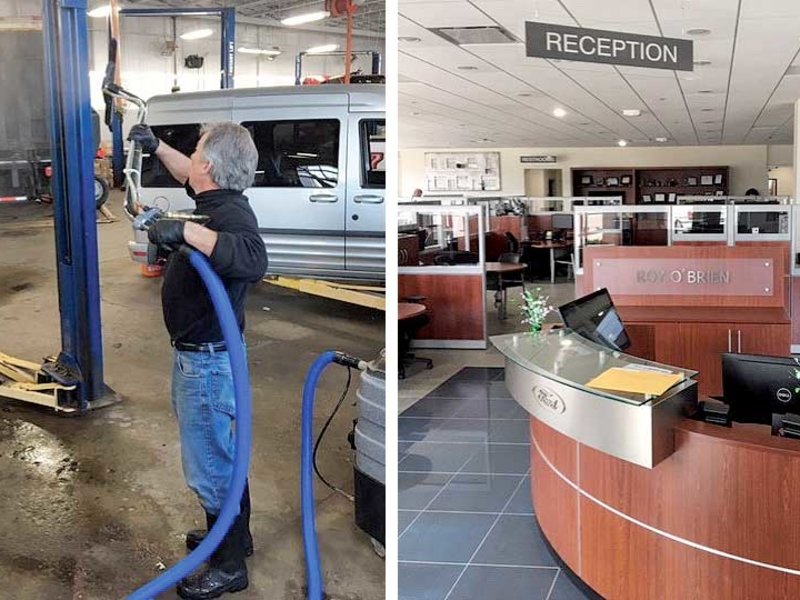
On March 11, an employee of Roy O’Brien Ford in St. Clair Shores, Mich., visited his pregnant sister. Three days later, she went into labor and developed a fever.
When the employee phoned the dealership to say his sister was awaiting the results of a COVID-19 test and he had potentially been exposed, leadership acted quickly.
“Our general manager — who happens to be my brother — and I sat down and talked about our plan of attack,” said dealership Chairman Mark O’Brien. The employee, who had worked at the store for several days before his sister developed symptoms, was told to quarantine at home for two weeks. On March 17, O’Brien and his brother decided to split shifts across the dealership.
Sales staff divided into two teams that would work every other week while technicians halved the day; morning shift clocked in at 7:30 a.m., leaving at 12:30 p.m., while a second team of technicians worked from 1 to 6 p.m. During the break between shifts, the service drive would be cleaned.
It’s important to allow technicians to start and finish their own jobs, O’Brien said, both from a compensation and a sanitation perspective.
On March 18, the sister’s test came back positive.
“We pulled the trigger on immediate closure,” O’Brien said. “If he was indeed a carrier, we needed to protect everyone else, including him.”
The decision to close the store wasn’t easy, but with no way to test the entire 105-member staff, O’Brien said remaining open wasn’t worth the risk. Even the employee who might be a potential carrier for the virus was told by doctors he couldn’t be tested because he wasn’t showing any symptoms.
O’Brien wouldn’t identify the employee beyond information that his position required him to interact often with sales and service staff. He is well-liked, O’Brien added.
“People always want to give him a pat on the back. It’s a natural assumption he crossed paths with probably 50 people a day,” he said.
Community reaction to the closure was immediate. Within an hour of posting on the store’s website and social media channels, O’Brien received panicked calls from nearby dealers asking if they, too, should close shop.
“We had a specific reason to shut down. We couldn’t take the risk of how many people who had been exposed to this employee might be carrying it and wouldn’t know,” he said.
Service is still operating during the closure, on the split-shift basis, and likely will continue that way when the store reopens.
A third-generation dealer of a 74-year-old store, O’Brien said he was unaccustomed to making decisions of this magnitude.
“We had to write to Ford and explain that we’re not abandoning our franchise,” he said. “My father never left us a game book on how to deal with this.”
Accommodating high-priority customer vehicles, such as a truck for a local landscaping business and a police vehicle, is a large focus, O’Brien said. Everyday an employee washes down each hoist for the mechanics between shifts.
For employees not currently working, O’Brien said the store has come up with a new pay plan.
About 80 percent of the store’s staff is paid on a commission or hourly basis. During the shutdown, O’Brien said each employee will receive $110 for every day they would have worked until the store reopens. But when it does, things will be different.
“There’ll be more cross-training in all departments,” he said. “We’re learning a lot from this new path that we’ve gone down. We will see an exponential rise in off-site deliveries.
“We don’t know how long this tunnel is. When we come out of it, we’re going to be a lot smarter, we’re going to be a lot more agile.”
As of Wednesday, March 25, O’Brien said not one dealership employee has called in to say they’ve tested positive for the virus. The exposed employee has continued to be symptom-free, and his sister brought home her son, Zacchaeus, safely from the hospital.
“I’m very optimistic. People are getting over the shock and hysteria,” O’Brien said.
Though the store had slated its reopening for April 1, Michigan Gov. Gretchen Whitmer issued a stay-at-home order effective at 12:01 a.m. March 24 through April 13, prohibiting people from leaving their homes for work “except to the extent that those workers are necessary to sustain or protect life or to conduct minimum basic operations.”
Auto sales are prohibited until then, though repair and maintenance operations can continue following the guidelines in the order.
Employees will have three choices after April 1, O’Brien said: They can file for unemployment, dip into their personal time off or apply for the soon-to-be revised federal Families First Coronavirus Response Act.
For now, five designated salespeople are fielding leads sent through the Internet sales department, keeping customers interested until the store can once again sell and deliver vehicles.
No matter what happens, though, O’Brien said technicians will continue to service customers, prioritizing city vehicles such as police cars and ambulances.
“Our hands are tied,” he said. “We’re not in business. But we’re not going to stop getting those vehicles back to their municipalities.”